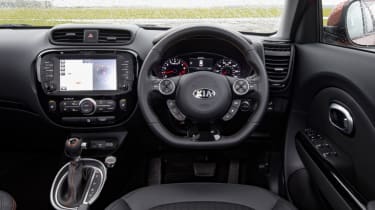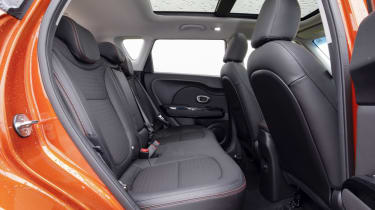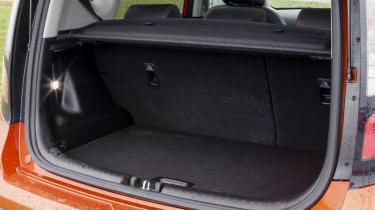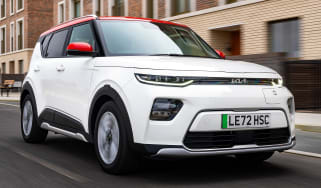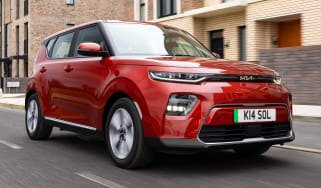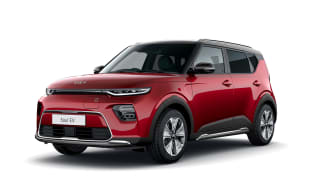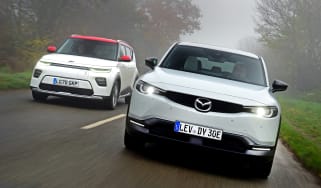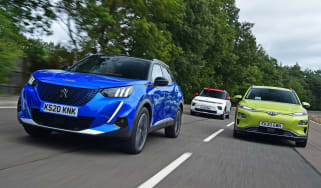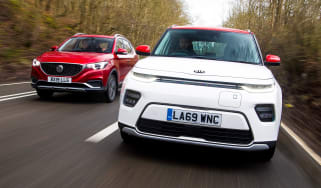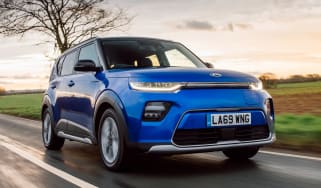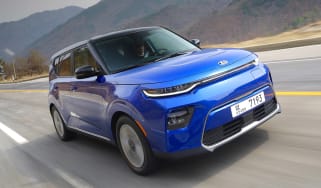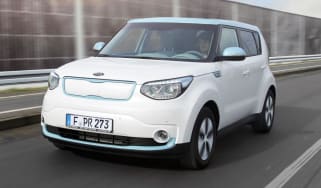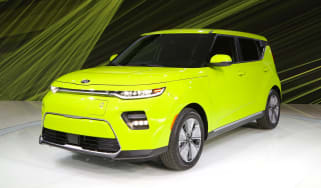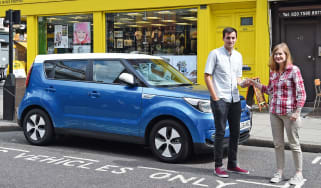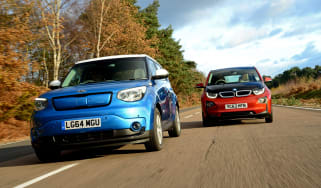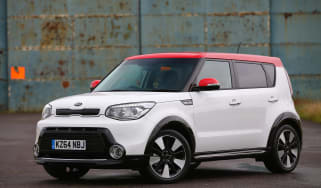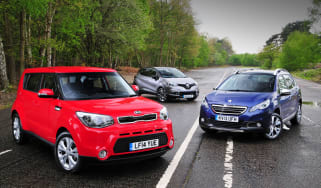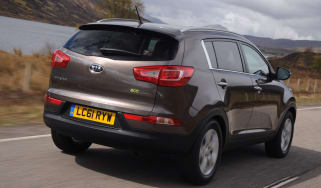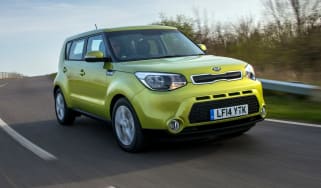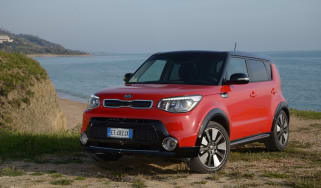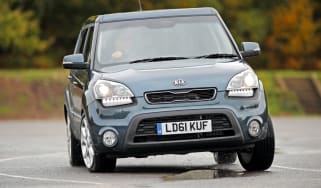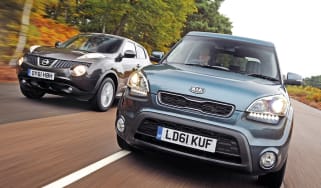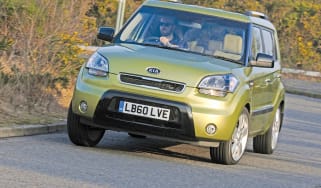Kia Soul (2014-2018) review
The latest Kia Soul keeps the chunky looks of the previous model, but improves practicality and equipment

The Kia Soul arrived in 2008 with looks that divided opinions, and the second generation Soul hasn’t done anything to significantly change that. However there’s no doubt the restyle has brought a bit more contemporary sparkle to the model, and it’s roomier and more practical too.
On the road the Soul offers decent handling, but sadly the engine line-up leaves a little to be desired. The petrol engine is thirsty, and the diesel clattery – two failings that rival crossover models have addressed much better. The Soul gives away a crash-test star to many of its rivals, too.
In its favour, the Kia Soul is well-priced, well-specified and feels well-built. It should be reliable, and comes with an industry-leading warranty.
We were treated to the original Kia Soul way back in 2008. It offered a distinctive alternative to the scores of mini-MPVs out there, but its divisive styling meant it was never a sales hit, despite a decent drive and practical interior.
The second-generation model aims to change that, though. The exterior styling is even bigger and bolder than before - it's based on the Track'ster concept from the 2013 Chicago Motor Show - but the boxy dimensions and interesting details have aged well and look positively funky compared to the Cee'd hatchback on which it's based. The Cee'd platform means it's even roomier and better to drive than before, and now the Soul is a credible alternative to other funky crossovers like the Nissan Juke and Citroen C4 Cactus, but with the practicality to rival the Renault Captur and Skoda Yeti.
Used - available now

2024 Volkswagen
Golf
72,479 milesAutomaticDiesel2.0L
Cash £18,100
2023 Audi
Q4 e-tron
60,733 milesAutomaticElectric
Cash £17,800
2020 Hyundai
Tucson
55,000 milesAutomaticPetrol1.6L
Cash £15,370
2019 Vauxhall
Crossland X
49,250 milesManualPetrol1.2L
Cash £6,990Buyers of the Soul have the choice of three 1.6-litre engines - two petrols and one diesel. The standard petrol offers up 130bhp, while the diesel has 126bhp, and promises lower running costs. Kia also offers a turbocharged 201bhp variant, known as the Soul Sport.
There's also an electric Kia Soul EV, which tackles the likes of the Hyundai Ioniq, BMW i3 and Nissan Leaf. It has a reasonable range, and is priced similarly to its rivals - but it feels a bit old-fashioned next to newer models.
Kit levels are pretty generous across across the trim levels, previously known as Start, Connect, Connect Plus, Mixx and Maxx, but now rationalised to 1, 2 and 3 - though the Sport gets its own trim.
The entry-level 1 is only offered with the 130bhp petrol engine and a manual gearbox, while only the diesel and Sport are available with an automatic, the Sport exclusively. Whichever Soul you choose, they all benefit from Kia's seven-year warranty.
Engines, performance and drive
Climb into the Kia Soul’s driving seat and a large windscreen, smaller A-Pillars and raised ride height give an excellent view out the front, and the wheel adjusts for reach and height – which gets things off to a good start.
Kia’s Flex Steer system gives you a button on the wheel to switch between Sport, Normal and Sport steering modes, but while weighting increases a bit, there’s little real difference in feedback or feel. However, the increased proportions of the latest model mean it feels more planted than earlier versions, while the more rigid body helps reduce body roll.
The six-speed manual gearbox is easy to use and there’s the option of a 7-speed automated dual clutch transmission from 2 trim onwards with the diesel engine, while the 201bhp Soul Sport is auto-only.
The Soul's ride, although not brilliant, is much improved over the outgoing model thanks to changes in the suspension setup. It’s comfortable on the motorway but it still fidgets about over sudden changes in the road surface.
While the limited range will put some customers off the EV version of the Soul, there's nothing wrong with the way it drives. Acceleration is brisk off the line and the lack of engine noise makes it smooth and relaxing to drive. It's heavier than the standard car, but the low centre of gravity means it feels secure and darts around corners nicely.
The relatively expensive Soul Sport remains something of a niche choice, given the car's focus on practicality. It's quick enough, but its large 18-inch alloy wheels exaggerate deficiencies in the standard car's ride.
Engines
You have a choice of a 1.6-litre petrol or 1.6-litre diesel engine with the Kia Soul. The standard petrol motor isn’t turbocharged, and while it's relatively cheap to buy, it's not particularly economical. The 1.6 diesel isn’t the most refined engine around and it fires up in the Soul with a clatter like the diesels of old and it never really smooths out on the move – although it settles down to a background hum at a cruise.
The petrol engine is marginally faster than the diesel in the official figures too, by two tenths of a second from zero to 60mph (10.6 seconds versus 10.8 seconds), and two mph flat out (115mph versus 112mph). The DCT/auto diesel has almost identical figures.
Performance from the turbocharged 201bhp Soul Sport is sprightly enough, with 0-62mph taking 7.5 seconds. Its numb steering doesn't engender much of a sense of fun though, while the dual-clutch gearbox is slow to shift when pressing on.
The Soul EV is powered by an electric motor with 109bhp, and has a range of 132 miles. 0-62mph takes 12 seconds and it'll go up to a top speed of 90mph.
MPG, CO2 and Running Costs
The Kia Soul is popular in the US, and the new model feels like it’s been tailored for that market.
It's a surprise that the new Kia Soul has poorer emissions and economy figures than its predecessor. Some of that is due to its increase in size, but the lack of stop-start also puts the 1.6 diesel on the back foot - on test, a return of 40.8mpg was 8.1mpg worse than the similar Peugeot 2008 which comes with stop-start technology.
Unlike some other Kia models, there's no super-efficient EcoDynamics version of the Soul, so those looking for ultra-low running costs will be disappointed.
The 1.6-litre diesel engine is the most economical choice, being officially pegged at 58.8mpg, but its 127g/km CO2 output is on the high side. If you go for the 1.6-litre petrol, those figures are 43.5mpg and 152g/km, while the Soul Sport emits 156g/km, and officially returns 40.9mpg.
If you really want to reduce your day-to-day running costs though, and don't need to cover big mileages very often, then the Soul EV is the one to go for. A full charge from a household socket will take between 10 to 12 hours, although fast chargers can top it up in around half an hour, but either way the electricity required costs a fraction of the price for a tank of fuel.
More expensive models come with lots of standard kit and every Soul benefits from Kia’s industry leading seven-year warranty.
Insurance groups
Insurance groups for the Kia Soul are pretty low, ranging from groups 9 and 10 for petrol models to groups 10 and 11 for diesels. The EV version is the most expensive to insure at group 18.
Depreciation
Depreciation is not over-kind to Kia models as a rule, but the Soul doesn’t suffer as much as some. Petrol models in cheaper trim levels will keep the largest percentage of their purchase price according to experts at CAP.
The manual petrol model is likely to do best, with a 46 per cent residual value over three-years/36,000 miles. That drops to 38 per cent for the range-topping Soul Sport, which is still some way better than the 32 percent residual value the electric version is predicted to achieve.
However with the Plug-in Grant, the electric vehicle’s depreciation is mitigated to the extent that total cost of ownership should ultimately be similar to the most expensive diesel.
To get an accurate valuation on a specific model check out our free car valuation tool...
Interior, design and technology
Whatever you thought about the styling of the original Kia Soul, you’re likely to maintain the same opinion of the new car. While the switch to a larger platform has increased the overall dimensions, the angular lines and boxy silhouette are pretty much the same as before.
The bluff front end features a false grille, and the air intakes have been moved down to the bumper. The combination of sharp angles and bulging wheelarch blisters gives it a bit of an SUV look.
At the back, large tail-lamps flank the upright tailgate with a flash of gloss black plastic connecting the lights, which makes it look similar to the Fiat Qubo, while the rear bumper sticks out awkwardly.
The cabin features quite a bit of black plastic – a familiar Kia feature – but the speaker-topped vertical air vents at either end of the dash add a bit of style to the cabin. Contrast stitching on the seats, honeycomb seat patterns and gloss black plastic around the gearlever also give the interior a lift.
If you avoid the entry–level 1 trim, the interior in the second-gen Soul is modern and fresh. An eight-inch colour touchscreen dominates the dash and gives the cabin an up-to-date feel.
Build quality is also excellent with lots of soft touch materials and big robust dial and switches. The layout is straightforward, while piano black inserts brighten up the cabin even further.
To mark it out from the pack, the Soul EV comes with a blanked-out front grille that opens to reveal a pair of charging ports - one for a standard charger and the other for a fast charger. A set of unique 16-inch wheels have been designed to slice through the air more efficiently, while there's a two-tone paint job on the outside and a lighter colour scheme for the interior.
Sat-nav, stereo and infotainment
A particular highlight on the Soul 3 and Sport is the eight-inch touchscreen. The graphics are crystal clear and easily legible, while the sat-nav map has clean graphics and you can even set up your own home menu that features the options you use most frequently.
The system features 8 speakers, and sat-nav with full European mapping. These models also get a 4.2-linch display between the dashboard dials. Bluetooth connectivity and a DAB radio with a minimum of six-speakers is standard across the range.
Practicality, comfort and boot space
Up front in the Kia Soul, it’s easy to get comfortable as there’s plenty of seat and wheel adjustment, plus you get a wide range of storage options, including a deep glovebox, door bins, and a centre console cubby with cup-holders. Higher trim models come with handy features like a reversing camera, navigation and Bluetooth.
There’s only the one five-door body-style, but that boxy profile makes it a spacious car to ride in – five adults should be able to travel in relative comfort. You also sit quite high, and with a good-sized glass area visibility is excellent.
Dimensions and size
The Kia Soul is bigger and more practical than ever. Compared to the first generation Soul, the latest version has a 20mm longer wheelbase and is 15mm wider, which contributes to a more spacious cabin and extra luggage room. It’s also 10mm lower to the ground so it’s easier to get in and out and headroom hasn’t been affected.
Leg room, head room & passenger space
The high roofline gives excellent headroom and the rear seats are comfortable. A small transmission tunnel also increases rear passenger space and you’ll have no trouble fitting three adults across the rear bench.
However, unlike some crossover rivals, the rear seats don’t slide and there’s no clever folding modulation. Isofix seat mounts for children are fitted as standard though.
Boot space
Boot space has increased by 14 litres to 354 litres compared to the previous model, plus you get extra storage under the boot floor. Even though the rear seats don’t fold fully flat you get 1,367 litres of luggage space if you load to the roof with the seats down.
A heating and cooling system for the battery pack in the EV model means you lose some of that underfloor storage however, reducing the boot space to 281 litres.
Reliability and Safety
Just like every other model in the Kia range, the Kia Soul comes with a seven-year warranty, although it seems that you’re unlikely to need to get any work carried out in the first years of ownership, as the company’s cars are impressively reliable.
The Soul is based on the Kia Cee’d’s running gear, so its mechanical components are tried and tested, while the EV model could be even more dependable because it uses fewer moving parts – although some of the powertrain control technology is new of course. Mileages are likely to be much reduced on electric models too.
However, while the Cee’d has a five-star safety rating and has good scores across the board, the Soul only managed to attain a four-star rating in the Euro NCAP independent crash tests.
Close scrutiny of the Euro NCAP report reveals spot-weld failure caused a rupture in the driver footwell “which precluded any demonstration from Kia that the knees and femurs would be well protected for different occupant statures and positions, and the steering column and the edge of the centre console were thought to pose a risk of injury”.
The car performed reasonably otherwise, and the safety kit list includes six airbags, while tyre pressure monitors are standard, and Connect Plus models feature a reversing camera.
And while the Soul didn't feature in our 2018 Driver Power customer satisfaction survey, Kia as a brand came eight out of 26 manufacturers, posting strong scores in the infotainment and practicality categories.
Warranty
The Kia Soul – and all its sister models – really excel in the warranty department, coming with a whopping seven-year guarantee with a 100,000 mile limit. The Nissan Juke comes with a three-year/60,000 mile warranty, which is about average for this class, but Hyundai comes closer with five years.
Servicing
You can take up a fixed servicing plan that includes three years of routine maintenance for £339 – or extend it to five years for £629.
